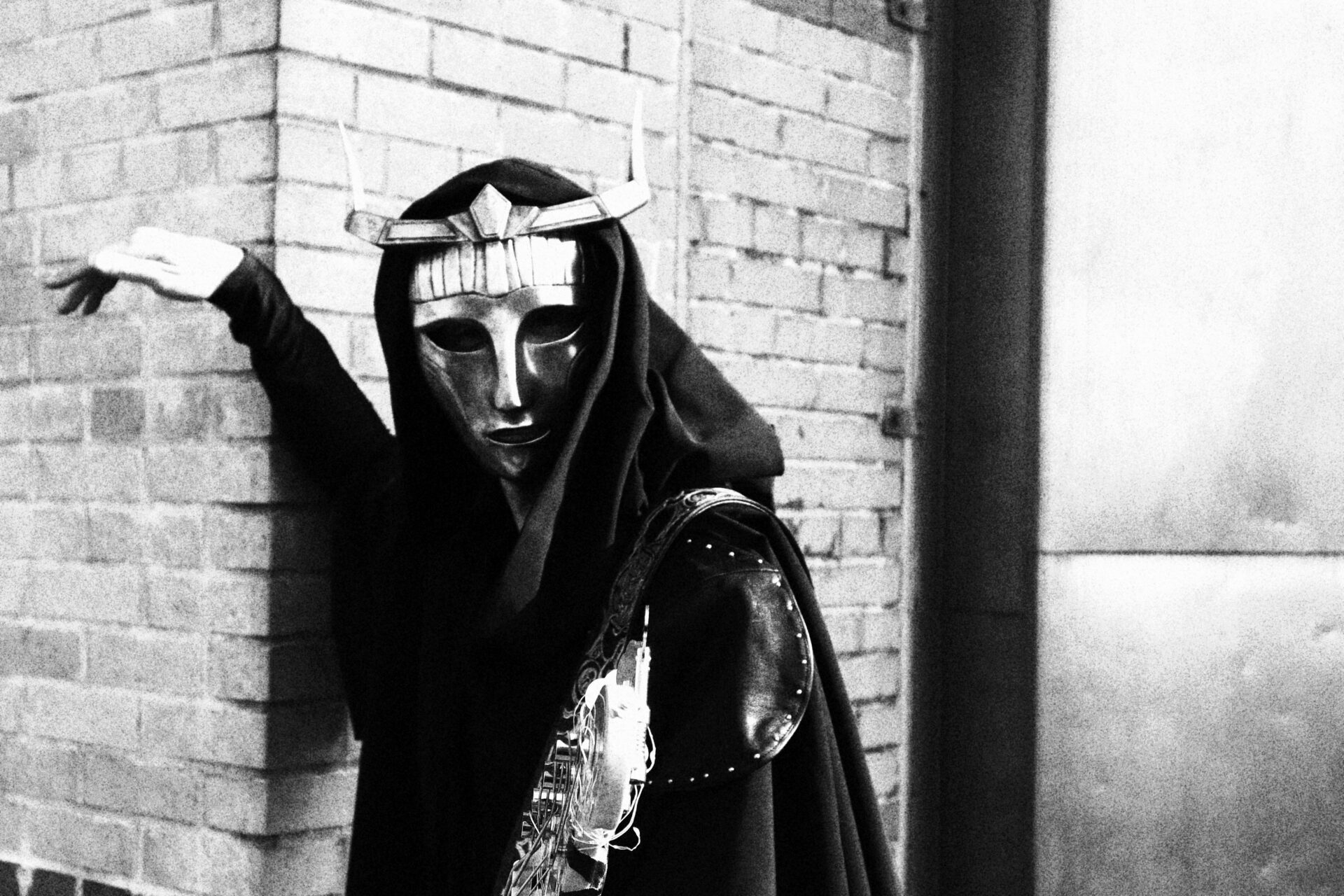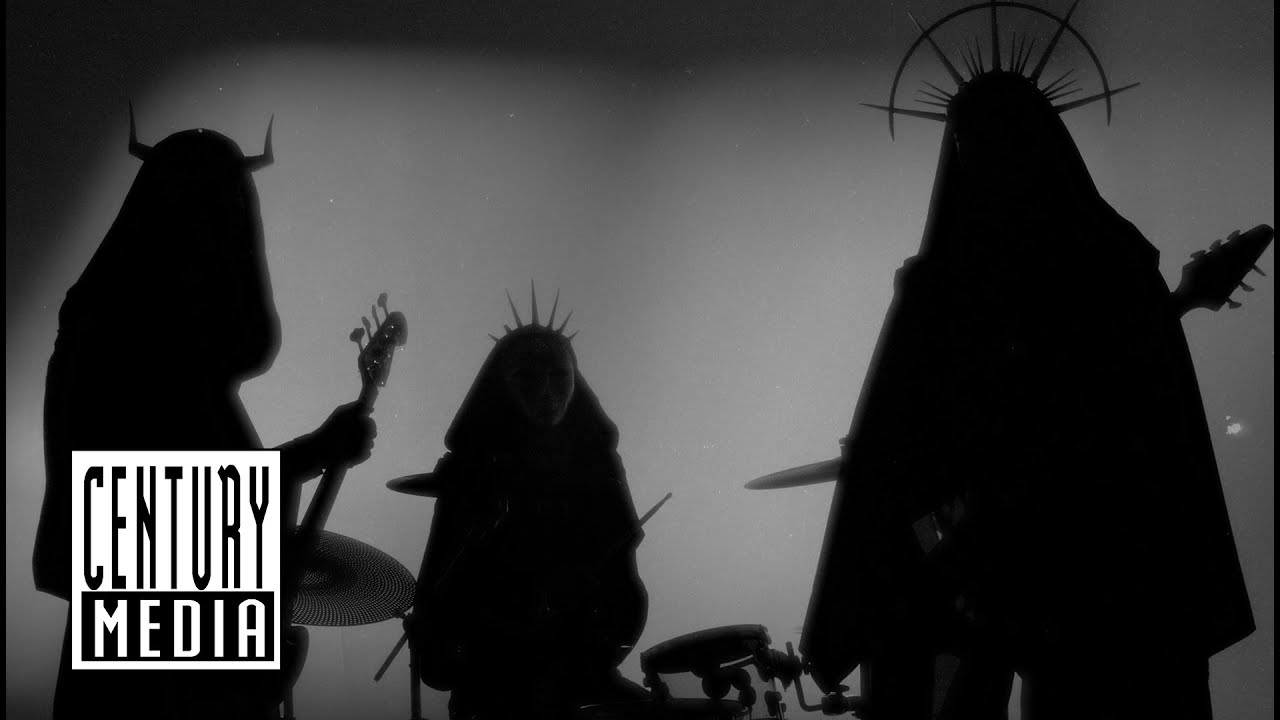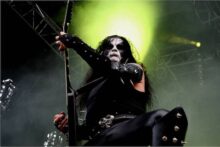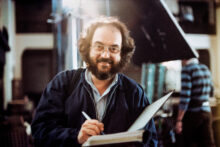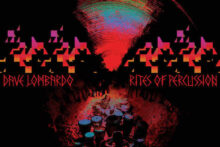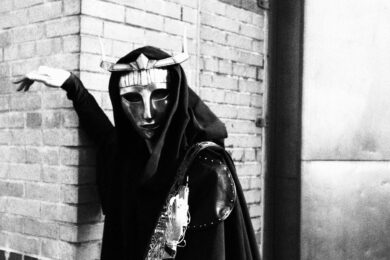For just under a year after construction was completed in 1930, the Chrysler Building in New York City was the tallest in the world. Located at the intersection of 42nd Street and Lexington, it remains the tallest building in the world made of brick. Its distinctive eagle-headed gargoyles, made from a corrosion-resistant stainless steel called Nirosta, still survey East Manhattan. It’s a monument to the Art Deco movement, now dead – yet in a way still living – in one of the world’s greatest cities.
New York City haunts the dreams, and obsesses the waking hours, of Imperial Triumphant. New album Goldstar can be placed alongside 2020’s Abscess Time by Pyrrhon in a small pantheon of great experimental metal albums about the city. The threepiece asks a fascinating musical question: what if death metal mutated out of jazz, rather than thrash?
Drummer Kenny Grohowski grew up playing with his Puerto Rican salsa singer grandfather, Bobby Cruz, and has collaborated with John Zorn and a host of others. Bassist Steve Blanco played jazz piano for twenty years before switching to bass. He has a sticker on his bass of Travis Bickle from Taxi Driver pointing a bloodied finger to his temple, simulating blowing his brains out. Guitarist/vocalist Zachary Ezrin plays a gold-plated Flying V in Imperial Triumphant. Alongside this, he has spent eight years jamming jazz manouche, swing and bluegrass in the clubs and speakeasies of New York. The cover of their 2021 lockdown live album, An Evening With Imperial Triumphant, was inspired by Duke Ellington’s 1963 record Money Jungle. They are not your typical extreme metal band.
For their single ‘Lexington Delirium’, the band filmed on the balcony and on an empty floor of the Chrysler Building. It was the first time anyone had filmed there since Francis Ford Coppola shot Megalopolis. With their ornate gilt masks and long black coats, they look like avatars of Fritz Lang’s forgotten future, sending out angular, discordant metal into the heavens.
The song begins with a faked film sample: “The future, like everything else, is no longer quite what it used to be”. Ezrin was in a furniture shop in Palm Beach, flicking through an Art Deco book on the coffee table, when the quote jumped out at him.
“It does really reflect Imperial Triumphant in many ways,” says Ezrin. “Particularly within the world that we dwell in: the retrofuturism, the avant-garde meets the 1920s, meets the 1960s jazz scene, meets the 1970s jazz scene, meets 1980s art rock, meets modern avant death metal. There’s so much musically and thematically that we play with. I feel like that quote does encapsulate us quite nicely.”
There’s a well-buried but unmistakable sample of media theorist Marshall McLuhan on the opening song of Goldstar, ‘Eye Of Mars’. McLuhan spoke of the “massaging” effects of mainstream media on the human psyche, and the “roughing up” inflicted by emergent forms. Imperial Triumphant embodies that roughing up: their sound is diamond-hard, somewhat impenetrable and virtuosic. The band’s breakthrough album, 2018’s Vile Luxury, pointed to their concern with the underbelly beneath the effulgent surface of things – the ‘Swarming Opulence’ all around. On it, they reframed New York as ‘Gotham Luxe’.
“I mean, bottom line, it’s a unique thing to explore in metal: decadence and luxury,” says Ezrin. “Because everything in metal is blood and guts and skeletons and ghouls and snakes and shit – fire and hell. And I think going the other route is interesting, and I’m thinking, oh, maybe there’s something there. I’m from New York City, so it’s coming from an authentic place.”
Goldstar has a 47-second improvised grindcore song called ‘NEWYORKCITY’ that rips through the middle of the album. It represents what Ezrin calls the “raw chaos” of New York in a blast of “dadaist insanity”and “a super-short amount of maximalism”. Featuring Yoshiko Ohara of Bloody Panda on vocals, the song is panned vertically to mimic the vertiginous skyscrapers of the city.
Imperial Triumphant might seem a world away from early nineties Norwegian black metal, but there’s a commitment to the architecture of the sound which rings true with the artistic intentions of that movement. Even if the contrast between the pagan, nationalistic origins of second-wave black metal is roughened up against the urbane, capitalistic aesthetic of Imperial Triumphant. Enslaved’s Ivar Bjørnson once told me of Mayhem guitarist and black-metal flag bearer Euronymous: “A gothic cathedral is the picture that he wanted to paint with music – like the Nosferatu movie before vampires became sexy. Where things are cold and derived from human emotion but contain the larger energies.”
The ambition of Imperial Triumphant seems similar – though they move away from the vision of F.W. Murnau and towards that of Chrysler Building architect Wiliam Van Alen. Into a world of an eternal present, and a recontextualising of the roaring twenties of the twentieth century into our more diffuse and fractured twenty-first century. At the same time, they don’t rehash what has come before. Their avant death metal is a high-contrast juxtaposition to their influences from the past. It dares to put modernism back together, piece by piece, in the wreckage of the 2020s.
“I think Art Deco in particular, plays a huge role in that concept of luxury, because it is all around us,” says Ezrin. “And it’s cool, because it’s kind of like a dead thing. They don’t make Art Deco buildings anymore. It’s all this old, pseudo-ancient architecture developed by people before computers were even a thing. With rare, imported materials to show off their wealth and power, and their obsession with speed and energy and new technology. And I think that’s all pretty metal!”
Power is important here. As the lyrics to ‘Lexington Delirium’ suggest: ‘This is a palace of mere progress/ All for one and none for all’. Walter Chrysler commissioned his building as a real-estate investment for his children. The power brokers of New York City – from Robert Moses (immortalised in Robert Caro’s immense biography) to Donald Trump – have been obsessed with monuments to their influence. Men of questionable ethics who have made the world in their image are useful fuel for music forged in a moral mirrorworld.
“I mean, Robert Moses is a great example, because he was a very powerful person with no title,” says Ezrin. “I like these sorts of grey characters. Obviously he was a massive piece of shit and bully, racist and all this stuff. But at the same time, he introduced huge changes to the shape of New York in ways that we still benefit from today. The infrastructure development was tremendous. And so that, to me, is really compelling because it’s dark, but it’s also good. I think that’s more interesting to me than the ‘true’ good and the ‘true’ evil.”
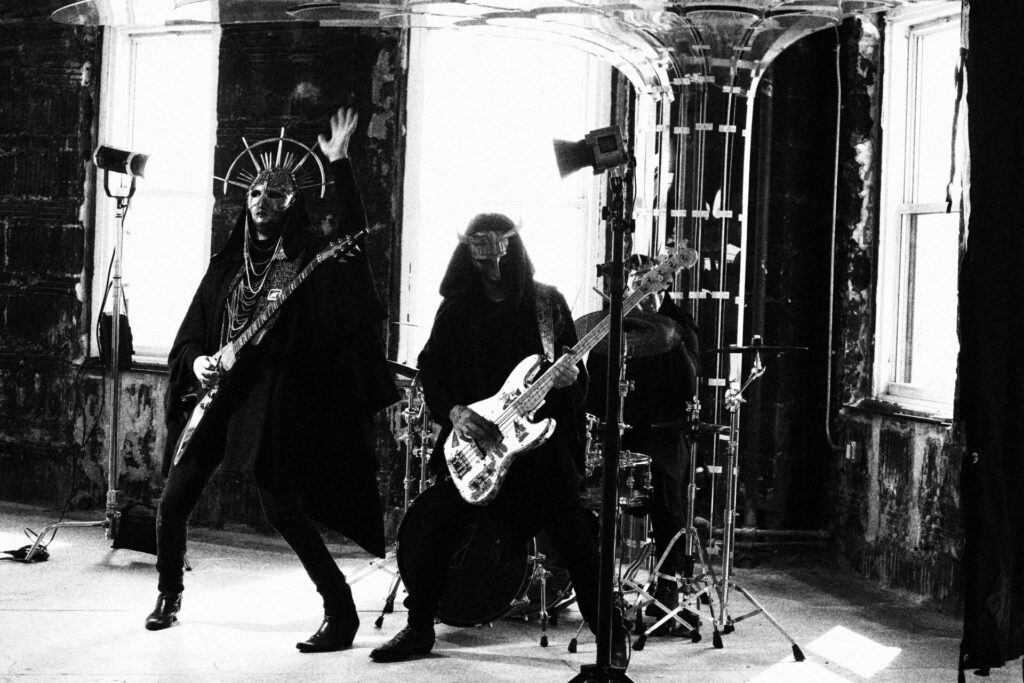
There’s another visionary in the shadows behind Imperial Triumphant: Stanley Kubrick. The band’s masks recall the attendees of the quasi-Masonic initiation in Eyes Wide Shut, more than they do Gwar or Slipknot. On ‘Hotel Sphinx’ from Goldstar they use the motif from Handel’s Sarabande in D Minor, the main theme of Kubrick’s Barry Lyndon, playing it on the synthesizer in the style of Wendy Carlos’ work on A Clockwork Orange.
“We’re not trying to rip off Handel, we’re trying to rip off Stanley Kubrick!” laughs Ezrin. Kubrick’s films are a character in their world, as much as music is an important character in his.
“When you hear Also sprach Zarathustra by Strauss, you think 2001: A Space Odyssey,” says Ezrin. “When you hear Music For The Funeral Of Queen Mary [by Henry Purcell], you think of A Clockwork Orange. He really used music in a very different way than a lot of directors before him, in the sense that there’s a lot of juxtaposition. There’s a lot of violence with beautiful classical music.”
But Imperial Triumphant are not a Stanley Kubrick tribute band. He is one of the ingredients they use to cook up their sound. Kubrick’s films tell stories, but in Ezrin’s mind it’s so much of the “subtext that’s unexplained” from which they draw their extraordinary power. Similarly, the band wants its music to be open, deep, something to explore, and ultimately unexplained, or unexplainable.
It follows that their fans buy into Imperial Triumphant without necessarily needing to understand their “lore”. Guests on Goldstar pass through the band’s distortion field to an alternate reality. Meshuggah’s Tomas Haake, one of the greatest drummers in the world, performs spoken-word sections. Dave Lombardo, one of the architects of thrash-metal drumming, performs a drum solo and percussion on ‘Pleasuredome’ which leans heavily into Brazilian Maracatu rhythms (the band steals “tastefully” from the musical style, as Ezrin describes it).
The song lets Lombardo drill into his Latin musical heritage as a Cuban musician whilst still feeling like a surprise from him. Just as on ‘Merkerius Gilded’ from 2022’s Spirit of Ecstasy album, smooth-jazz saxophone king Kenny G positively shredded over the song. Lesser-known musicians, like singer R.K. Halvørson, fill in the picture with their own colours – in this case a retro-sounding jingle for the fictional Goldstar cigarette brand: “When the world is falling/ Listen to them calling”.
The strong impression from Goldstar is of a band able to take its sound anywhere it chooses. The lilting rhythm of the Moroccan Gnawa music Ezrin was digging while writing the album is ratcheted up to the febrile garroting of ‘Gomorrah Nouveaux’. I point out how the languid, almost insidious bass riff of closer ‘Industry Of Misery’ brings to mind King Crimson’s ‘Starless’. Ezrin counters it was more of a nod to The Beatles’ ‘She’s So Heavy’: “I think it’s fair to say that if you were doing a math equation of ‘She’s So Heavy’ by The Beatles multiplied by Imperial Triumphant, you will get ‘Starless’.”
For Goldstar, the band put restrictions on themselves which they felt expanded their creativity. A wealth of support slots following Spirit Of Ecstasy challenged them to reconfigure their material to have impact over thirty minute-long sets. In 2023, the band released a series of out-there cover versions, including Metallica’s ‘Motorbreath’ and Radiohead’s ‘Paranoid Android’ amongst others. This didn’t teach them how to craft more accessible songs, as much as how to rearrange the DNA of a song. They put a five-minute limit on the song lengths of Goldstar’s material which they largely stuck to – ‘Industry Of Misery’ being the stark exception that proves the rule. They recorded the album in five days at Colin Marston’s Menegroth Studios in Queens, New York.
‘Industry Of Misery’, with its lyric “Kleptocratic regimes manufacture crisis” also seems to be an uncanny summation of America 2025. I wonder what the president with the golden toilet would make of the band with the golden masks.
“I’m not trying to be one of those conspiracy theory guys,” says Ezrin. “But whatever we write in our lyrics – that song was written two years ago – it just tends to become the case. And it was the same thing with [2020’s] Alphaville. It’s so funny like that. These lyrics tend to reveal what’s going on before we even expect it.”
Alphaville rammed home Imperial Triumphant’s obsession with everything gold: from the resplendently detailed cover art by Zbigniew M. Bielak to the title track’s impetus to “move past the scum’ and “toward the gilded light”. As above, so below. They are associated with gold in the same way Brooklyn goth-doomers Type O Negative owned the colour green.
They also share an unlikely sense of humour with the Drab Four. Past Imperial Triumphant shows have seen the band douse the audience in champagne and consistently throw shapes. Ezrin doesn’t see himself as angry, or a “dark character” when he’s performing. He loves being in his band.
“It’s important when you’re in an avant-garde death metal band to enjoy yourself on stage,” he says. “And I think the humour that we have on stage is less of silliness, and more coming from a place of confidence and enjoying ourselves.”
For Ezrin, the jazz in Imperial Triumphant resides not in the major seventh chords or the band’s swing, but in the conversation that they have between their instruments. The songs change, sometimes imperceptibly, but they are always changing.
“It’s like we’re playing our own standards,” says Ezrin. “There’s something to be said about the fact that we can’t talk to each other on stage because we have these fucking masks. We can only communicate through our instruments. So if someone slows down or someone misses a note, everyone catches it and falls back: we play together as one unit.”
Live metal is awash with backing tracks, digitally modelled amplifiers, and bands playing to a click track. At times, watching big metal acts plough through the same setlist night after night, it feels like life is being drained out of the genre. Metal’s mechanical rigidity can be a thing of beauty, but spontaneity has its own rewards.
“There’s nothing wrong with playing to a click track, I’m not knocking it,” says Ezrin. “But you don’t have the liberty of laying back and maybe taking an extra-long solo or playing a bit slower because the vibe that night requires it, or doing a perfect accelerando with the rest of the band.”
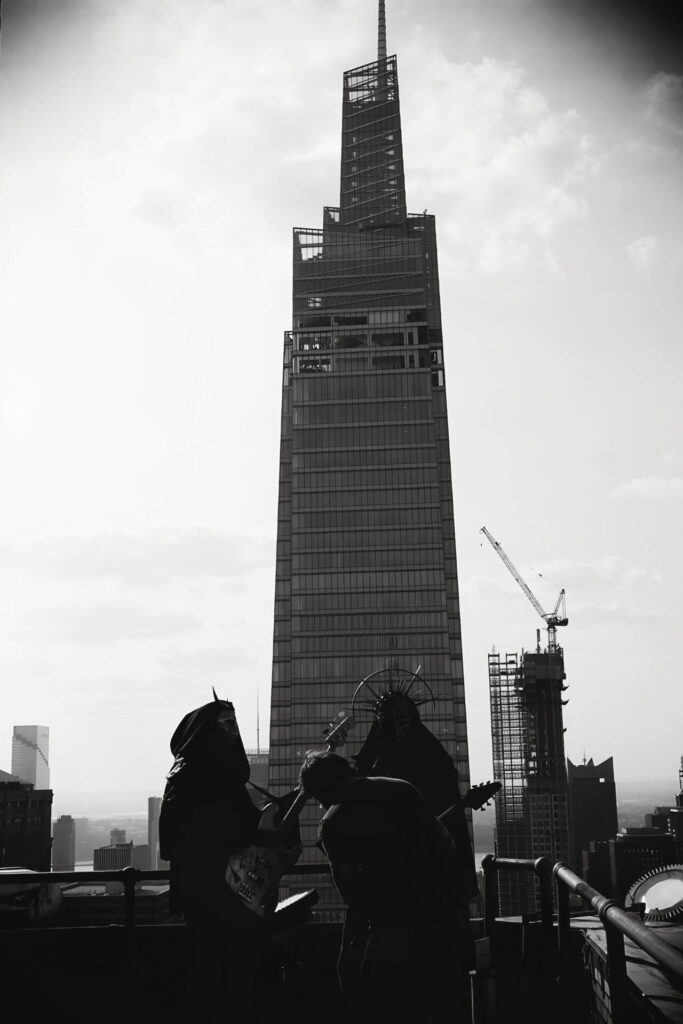
Imperial Triumphant are set on accelerating into a future that’s already behind us. Goldstar’s layers peel themselves back to reveal the blight beneath. But at least they embrace modernity and the promises of the present in the “red meat and nicotine” of “delirious New York” (‘Rot Moderne’).
As America enters a purported “new golden age”, it’s a question of which imperial myths of progress you choose to believe. Why not believe in the Art-Deco hallucinations of three Kubrick-obsessed jazz heads who play avant-garde death metal? They make a strong case that modernism never went away. It’s just been dreaming of itself – or taking a cigarette break.

